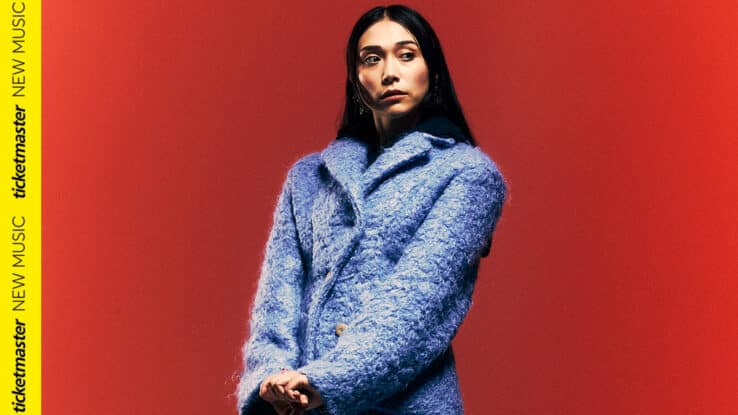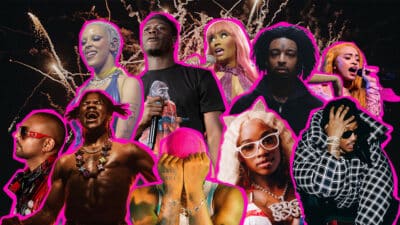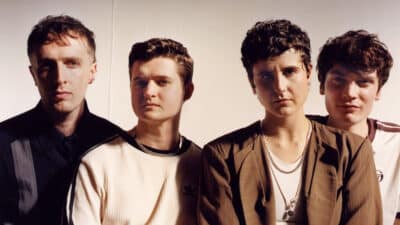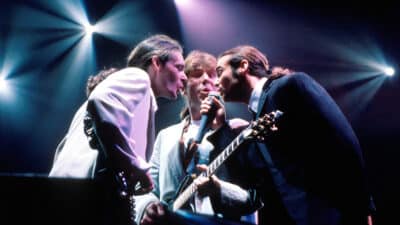Interview

Interview
Miso Extra: “Asian women aren’t encouraged to be overtly outgoing. But it’s okay to be extra”
The singer/rapper/producer talks “accidental” beginnings, how cinema shaped her imagination, and being unabashedly extra
“Umami for the ears” is how Miso Extra self-describes her music, a vibrant melting pot of hip hop-hyperpop that links the food of her dual heritage to her boundless imagination. The Hong Kong-born artist lived in Japan for several years before moving to London as a child, and her two EPs, Great Taste and MSG, connect the dots from her past to her present. But there’s much more to her multi-hyphenate catalogue of music.
Flitting from angelic English-language vocals to rapping in Japanese, Miso is as influenced by the sampling ingenuity of cult hip hop heroes MF DOOM and J Dilla as she is Studio Ghibli and the wistful scores of Joe Hisaishi. Though she coyly suggests it’s been an “accidental journey” so far, her artistry is effortlessly original and cohesive.
Ahead of Miso Extra’s headline hometown show at The Lower Third in London, and a handful of appearances at SXSW, the singer/rapper/producer caught up with us to discuss her musical beginnings, the impact cinema has had on her, and being unabashedly extra.
Can you tell us about your relationship to music growing up, and what kind of music you first connected to?
I’ve always loved music, it’s something I’ve always dabbled in. I learned the violin growing up, though that’s as far as my formal training with music goes. I was in a choir in school – I had a really wonderful primary school teacher who really loved music, and she helped instil that love in me early on. I had this Fisher Price tape recorder, the one with the microphone, and I had a Casio too. In my head, they feel like my earliest memories of making music. As I got older, it progressed into experimenting with different instruments, though none of them stuck. I feel like a terrible musician, but the beauty of music production is that you don’t have to be a virtuoso.
Having the relationship that I do with Tricky and Duke – who are the producers I primarily work and share a studio with – has been vital. Having friends who encourage me along the way, and being introduced to the idea of music production and knowing ‘oh I don’t have to be in a band’, frees me to make music and trust that it’ll sound somewhat ok.
When did you start believing that music could be a career?
When I sent my first project – Great Taste – to a friend, who sent it to my now-manager. It wasn’t until that point that I realised, ‘this is my career path’ – something that’s beautifully blossomed from my shy, introverted self sending a demo to a friend. It’s been an accidental journey, but definitely one that I’m enjoying, and taking very seriously.
When did you come up with the moniker Miso Extra, and does it represent anything?
It’s a critique. Being mixed race, part-Japanese, there was a racial slur shouted at me at school. It’s been a running joke that I’d play up to this idea of being ‘Miso Extra’ but reclaiming ownership over that phrase. I’m not going to repeat the phrase that was said to me, but was a mis-pronunciation. Like, “me so horny”, or whatever. Asian women aren’t encouraged to be overtly outgoing, but it’s ok to be extra. I can be whatever extroverted version of me I wish to be, and with that, allow other women of the diaspora to partake in that.
You have a pretty maximalist approach to music-making, for instance ‘Space Junk’ sounds like early 00s R&B, whereas ‘1013’ is grounded in hip hop. Does anything go when you enter the Misoverse?
‘1013’ is a straight-up love letter to Madvillain’s ‘Accordion’! The Misoverse is a bit of everything that sounds delicious to me. When it comes to genre, it’s whatever the music requires. Ultimately, I make electro with hip hop tempos. The song structures are very strict R&B, with alt-indie leanings. It pulls from a few different places.
You’ve cited J Dilla and MF DOOM as major influences. When did you discover hip hop as an art form, and when did you start rapping yourself?
I’ve privately rapped for a long time. I’ve always loved poetry, I’ve always loved hip hop and rap music. I’ve never really thought that deeply about it, it’s just something that I’ve always felt naturally inclined to want to make.
Your lyrics are littered with cinematic references. What kind of impact did cinema – and particularly Studio Ghibli – have on you growing up?
I love cinema so much. I watched a lot of videos my grandma recorded of Japanese television, which was one of the key ways I learned how to speak and understand Japanese growing up. I’m a very visual person, and have a very active imagination. Cinema allows me to indulge in that. With that comes the music, the soundtrack. I see it as an all encompassing thing. I watch a lot of films so it’s only apt that I integrate those references. I think hip hop has a long-standing relationship with anime, in terms of helping create analogies for people to understand the references in their lyrics.
In terms of Studio Ghibli, it offered me female protagonists that weren’t overly sexualised, and [didn’t] need a romantic arc for their character, which is standard in Western cinema, particularly Disney. It focused on the empowerment of young women, rather than having to find their power in a romantic counterpart. You can be a standalone individual, with friends, and with value. They’re very much led by their morals and belief systems rather than being based on a romantic relationship.
Not many artists sing and rap as immaculately as you, let alone in two different languages. Do you intentionally write in both English and Japanese, or is it just a natural outcome of your creative process?
It is very much a natural outcome. It’s a complete accident. For the first and second EP – because I wrote them as ‘Part A’ and ‘Part B’ – a lot of the Japanese is my internal monologue, what people can’t always understand and what few people can. My English side is the front-facing, sassy, overt side. Metaphorically and stylistically that’s how the first two EP’s were conceived. A lot of the songs from Great Taste were written in Japanese, and I later added the English parts. It’s not as premeditated as you might think, though some considerations are made. Whatever the song needs really.
In the spirit of International Women’s Day, are there any female artists you’re listening to right now?
Merry Lamb Lamb, who I’ve just put out a song with. I featured on a song with her and aimei, which was a real moment. She’s actually supporting me at my upcoming show in London, so big up Merry Lamb Lamb. Fabiana Palladino, a brilliant artist. Shout-out to RAYE for her recent Brit Award wins, that’s an achievement and a half. I’m so happy for her, especially with everything she’s been through. Her success is everyone’s success really. Props to any woman in the music industry.
Are there any artists you’d love to invite into your Misoverse and collaborate with in the future?
Everyone is welcome. We operate on an open-door policy here in the Misoverse. There’s an invitation for every belief system and walk of life.
Do you have any particular ambitions for the year ahead?
I would love to tour more, specifically more of Europe. It might be ambitious to say I want to play in Japan. I’m putting that energy out there, I’d love that so much. And to record and release new music is always the goal.
Miso Extra starts her UK tour from 12 March. Find tickets here









